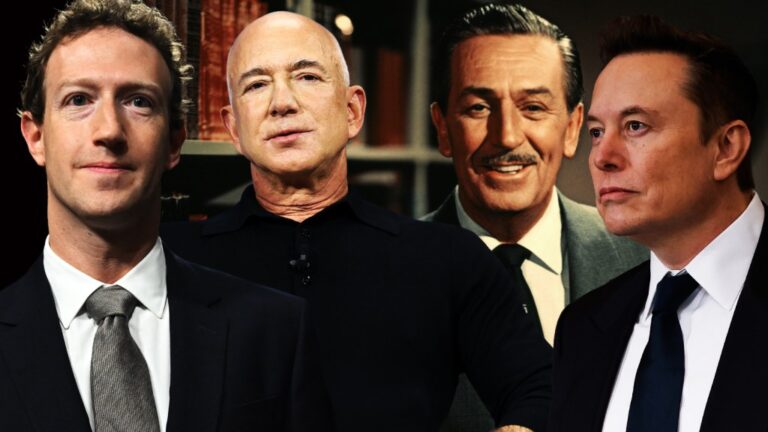These aren’t fun times for billionaires, even though their number keeps proliferating along with their numbers — there are now at least 17 documented “super billionaires” with assets of more than $100 billion. Still, Elon Musk’s Tesla dealerships are being torched, Jeff Bezos’ newspaper is under siege, and Mark Zuckerberg is trying to suppress a new book titled Careless People.
Even Larry Ellison and his son David are having trouble closing their Paramount deal as new interlopers and random Trump bureaucrats intrude. It’s no wonder that Billions, the TV series, ended its run.
Walt Disney, for one, would have been exasperated by the issues overtaking the mega-rich today and, given the environment, might never have greenlighted Snow White — details below.
Whenever Hollywood hit troubled times in the past, two or three Medici-like billionaires would start writing checks and be warmly welcomed into the community. Even flakey Howard Hughes won applause for buying RKO to gain free rein over Hell’s Angels and start casting his starlets.
Serious-minded investors like music tycoon Saul Zaentz saw Hollywood’s problems as an opportunity to finance art films like One Flew Over the Cuckoo’s Nest or Amadeus. Cuckoo’s Nest was set in a psychiatric hospital, which Zaentz said was “an appropriate setting for anyone investing in film.”
RELATED: Boston Celtics Docuseries Set At HBO From ‘30 For 30′ Producers
Prospective film funding would seem to be even more abundant these days with the bilious brethren flirting with extravagant outside deals: A new cybersecurity company called Wiz went for $32 billion in cash last week, thanks to Google, and the once-stodgy Boston Celtics basketball team was sold for a record $6.1 billion.

Robert Pattinson in ‘Mickey 17’ and Rachel Zegler ‘Snow White’
Warner Bros Pictures; Disney; Everett Collection
Meanwhile, film budgets, too, are bursting barriers — $200 million for Warner Bros’ Mickey 17 and $300 million for Disney’s Snow White.
Would Walt Disney himself have stepped up to these budgets?
I had a freewheeling lunch with him a year before his death in 1966 and found him a bit down on movies. He was disappointed by the mediocre grosses of his costly Alice in Wonderland and appalled by the $5 million projected budget of a Don Quixote musical adaptation.
“I was talked into Alice, and I don’t like being talked into things,” he said, reiterating his disinterest in giving Quixote a green light. “Filmmakers don’t understand the high cost of translating whimsy onto the screen,” he told me, suggesting that he might even have had reservations about Snow White.
Much as he loved movies, Disney himself was brimming with late-in-life excitement about a range of more down-to-earth projects. They included an $80 million Alpine Village in Sequoia National Forest and a $40 million stake in a new university called CalArts in Santa Clarita north of L.A. that would offer courses in everything from fashion to music to animation. At the same time, he was willing to pour tens of millions into a reconceived Tomorrowland at Disneyland in Anaheim and a massive expansion in Orlando.
While the success of Mary Poppins in 1965 pleased him, Disney acknowledged that he still preferred to doze off watching “dopey” animal stuff like The Ugly Dachshund or Monkeys, Go Home.

Disney’s ‘The Ugly Dachshund’ (1966) and ‘Monkeys, Go Home’ (1967)
Disney/Everett Collection
Those modest forays provided comfort food for him and his friends as well as a release from the complex narratives and bigger budgets of an Alice or a Snow White. Poppins, like Snow, had a budget in the low millions, but Poppins grossed $30 million in its first run, roughly three times as much as Snow White, according to Disney. And it still awaited its TV sale.
Aside from cost, the political ramifications of the “bigger movies” disturbed Disney. The Hispanic community would be especially sensitive to a Don Quixote faux pas, he said, as though predicting the present problems involving Snow White.
“I spent too much time last year supporting Barry Goldwater, and it simply was not interesting or rewarding to me,” he said, blinking his weary, heavy-lidded eyes and lighting another cigarette (his fourth of our conversation).
Goldwater, of course, was buried politically by Lyndon Johnson.
On the other hand, Disney knew that I also was reporting for The New York Times on the political rise of Ronald Reagan, adding, “You’ve been very fair to Reagan, unlike most journalists, but still, politics is boring, isn’t it? Wouldn’t you rather write about Ugly Dachshund?”


